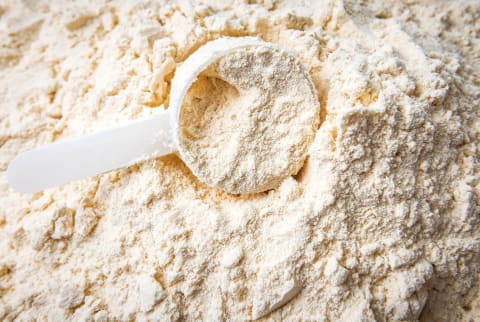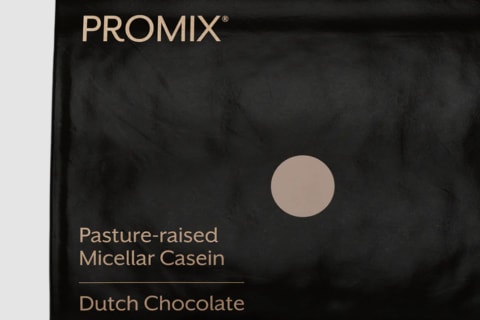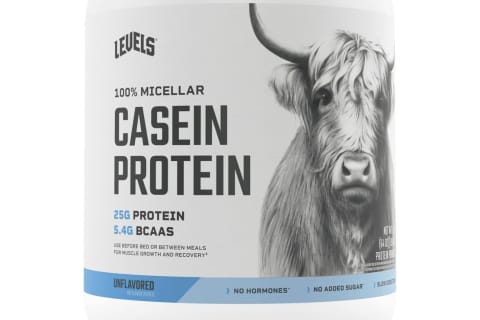Advertisement
Casein Protein: What's It Good For & Who Should Take It?


Casein protein is a slow-digesting protein commonly found in dairy products. It's popular among athletes and bodybuilders for maximizing muscle growth and recovery. However, like all proteins, casein has pros and cons, and it's essential to understand how it compares to other protein sources.
In this article, we'll explore the benefits and drawbacks of casein protein and how it stacks up against other sources like whey and pea.
What is casein protein?
Casein protein is a type of protein found in milk and dairy products (it makes up 80% of the protein content1 in dairy milk). It's known for its slow digestion rate2, which means it's absorbed by the body more gradually than other proteins like whey.
Casein protein comes from the curds that form when milk is coagulated, while whey protein comes from the liquid that separates during cheese-making.
Unlike whey protein, casein can take up to seven hours3 for the body to fully break down and absorb. This makes it an ideal protein source for people who want a sustained release of protein throughout the day or night, such as bodybuilders, athletes, and those who exercise regularly.
Casein protein's texture is thicker and creamier than whey protein, with a slightly bland taste. Many people consume casein protein in a protein powder supplement to increase their protein intake and support muscle growth and recovery.
In addition, it's often used as a bedtime protein supplement, as it can help provide a slow and steady supply of protein to the body while sleeping.
Summary
Benefits
It may enhance muscle growth
Casein protein has a unique ability to provide a slow and sustained release of amino acids, which can lead to prolonged muscle protein synthesis (MPS) compared to other protein sources like whey.
Research has shown that consuming casein before bed can enhance overnight MPS and improve muscle recovery. For example, one study found that participants who consumed casein before bed had greater MPS rates4 throughout the night than those who consumed whey. Another study concluded that consuming casein protein within 30 minutes before bed5 also increased MPS rates.
It may be better for those with digestive issues
Casein protein has a slower digestion rate than whey protein, which may make it more suitable for individuals who experience digestive discomfort. This is because casein forms a gel-like substance in the stomach, slowing gastric emptying6 and leading to a delayed release of amino acids.
Research shows that casein is more slowly digested than whey2, resulting in a lower peak amino acid concentration in the blood. This slower digestion rate may also contribute to the satiating effects of casein, as discussed below.
It may have blood-pressure-lowering effects
Research has shown that consuming casein may have blood-pressure-lowering effects. For example, one study found that people who consumed casein protein7 had lower systolic blood pressure, reduced cardiovascular disease risk, and better blood sugar regulation.
Additionally, a 2013 meta-analysis8 concluded that consuming casein reduced diastolic and systolic blood pressure in individuals with prehypertension or stage 1 high blood pressure.
It is more satiating than other protein sources
Casein is more satiating than other protein sources due to its slower digestion rate and prolonged release of amino acids. One study found that participants who consumed casein protein had lower reported hunger and higher satiety ratings9 than those who consumed whey.
According to another scientific review, casein protein can reduce appetite and energy intake10 significantly more than whey.
It is a complete protein
Casein is a complete protein source11, meaning it contains all nine essential amino acids that the body cannot produce on its own. It's also rich in branched-chain amino acids (BCAAs), which play a crucial role in MPS and recovery.
One study found that casein protein supplementation improved muscle recovery12 and reduced muscle soreness following intense exercise, particularly when done in the evening.
Downsides of casein
Slow absorption may not be ideal for post-workout recovery
While casein's slow digestion can be an advantage for promoting satiety, it may not be ideal for post-workout recovery. For example, a 2016 study found that whey protein was more effective in promoting MPS13 after exercise.
In addition, another older study concluded that consuming whey protein improved muscle mass and strength14 more than casein. More research is needed on the topic 15in regards to effects on performance.
Higher potential for allergies or intolerances
Though casein is a complete protein and a good source of essential amino acids, it may not be the best choice for those with dairy allergies or lactose intolerance.
Older research found that casein was more allergenic than whey protein16 and may be responsible for more cases of milk protein allergy. Additionally, those with lactose intolerance may have difficulty digesting casein17, which can cause gastrointestinal discomfort.
A1 vs. A2
A1 and A2 beta-casein are two types of casein proteins found in milk. A1 beta-casein results from a genetic mutation in European cows18, whereas A2 beta-casein is the original protein found in cows from Asia and Africa, as well as most goats and sheep.
"The A1 and A2 casein variants differ in their amino acid composition19, leading to changes in the structure of the casein protein," Svetlana Nepocatych, Ph.D., RDN, a registered dietitian nutritionist and associate professor at the Elon University Department of Exercise Science, previously told mindbodygreen.
Some studies suggest that A2 beta-casein may be easier to digest and less likely to cause gastrointestinal symptoms20, such as bloating and diarrhea, than A1 beta-casein. "A2 casein tends to be less inflammatory and less likely to cause gut issues," functional medicine doctor Mark Hyman, M.D., says on the mindbodygreen podcast.
However, more research is needed20 to confirm these findings and determine if one type of casein is definitively better for individuals with GI sensitivity.
Summary
Casein vs. other protein sources
Ultimately, every protein source has benefits and drawbacks.
Whey protein is an excellent option for those looking for a fast-absorbing, high-quality protein source. Plant-based or vegan protein powders can be a good choice for individuals with dietary restrictions or those seeking a more sustainable protein source21. Casein protein provides a slower release of amino acids and may benefit muscle recovery and growth, particularly when consumed before bed.
Here's the scoop on how casein stacks up to other protein sources across a few key areas:
Amino acid content
Compared to other protein sources, whey protein has a higher concentration of essential amino acids, particularly leucine, which is a key trigger for MPS.
Plant proteins like pea and hemp can be lacking in certain essential amino acids22, such as lysine. Therefore, plant proteins may require combining different plant sources to achieve a complete amino acid profile.
Where casein falls
Digestibility
Regarding digestibility, whey protein is often considered the easiest to digest, with a high absorption rate and low likelihood of causing digestive issues.
Plant proteins can be more difficult to digest22, particularly for individuals with sensitive digestive systems, and may require digestive enzymes to improve absorption.
Where casein falls
Flavor & cost
When it comes to flavor, whey protein is often praised for its pleasant taste and variety of flavors available on the market. However, plant-based proteins can vary widely in flavor, with some brands and sources tasting better than others. Whey is more affordable than most plant proteins.
Where casein falls
How to take it
Casein is found in many dairy products, such as milk, cheese, and yogurt. However, if you're looking for a nondairy source of casein, it can also be found in some protein bars and powders.
While there isn't necessarily a "best" time of day to consume casein, many people take it before bed to promote MPS. Research23 suggests that consuming at least 40 grams of casein before bed can effectively promote MPS at night.
When taking casein, it's important to remember that it shouldn't be used as a complete replacement for whole foods. Instead, it can be a helpful supplement to ensure adequate protein intake each day.
What to look for in a casein powder
If you are going to use a casein protein powder, look for a brand that's sustainably sourced and low in additives and sugars. A third-party-tested supplement is another important factor to consider to verify the ingredients in the product.
By choosing a sustainably sourced, high-quality, and low-additive casein powder, you can feel good about both the environmental impact and the effects on your body.
mbg's picks for clean casein proteins
Side effects & safety
Supplementing with casein protein is considered safe for most people when taken appropriately.
However, some individuals may experience mild side effects24 such as bloating, gas, and gastrointestinal discomfort due to its slow digestion rate. In addition, those with dairy allergies or lactose intolerance should avoid casein protein supplements altogether.
Regarding long-term safety, some studies25 have suggested that high protein intake from casein and other sources may put additional strain on the kidneys and liver in individuals with preexisting kidney or liver conditions. However, more research is needed to fully understand the potential risks.
As with any supplement, consult a health care professional before taking casein protein.
FAQ
What does casein protein do?
Casein protein is a slow-digesting protein that helps to promote MPS, making it a popular choice for those looking to build muscle and prevent muscle breakdown. It also provides a feeling of fullness and helps regulate blood sugar levels.
Is casein better than whey protein?
Whether casein or whey protein is better depends on individual goals and needs. For example, casein is slower digesting and provides a longer period of MPS, making it a good option before bed or as a meal replacement. Conversely, whey protein is more quickly absorbed and may be better for post-workout recovery.
What foods are high in casein?
Foods high in casein include dairy products such as milk, cheese, and yogurt. Other casein sources include protein supplements from milk protein isolate or micellar casein.
The takeaway
Casein protein is a slow-digesting protein found in dairy products that's popular among athletes and bodybuilders for maximizing muscle growth and recovery.
The benefits of casein protein include muscle protein synthesis, digestibility, blood pressure reduction, satiety, and a complete amino acid profile.
However, its slow absorption may not be ideal for post-workout recovery, and it may have a higher potential for allergies or intolerances.
25 Sources
- https://www.ncbi.nlm.nih.gov/pmc/articles/PMC4632440/
- https://www.ncbi.nlm.nih.gov/pmc/articles/PMC7468913/
- https://www.ncbi.nlm.nih.gov/pmc/articles/PMC5421981/
- https://pubmed.ncbi.nlm.nih.gov/32698256/
- https://www.mdpi.com/1660-4601/18/1/103
- https://www.sciencedirect.com/science/article/pii/S0022030218304247
- https://pubmed.ncbi.nlm.nih.gov/36235859/
- https://www.ncbi.nlm.nih.gov/pmc/articles/PMC4303860/
- https://www.ncbi.nlm.nih.gov/pmc/articles/PMC3941822/
- https://www.ncbi.nlm.nih.gov/pmc/articles/PMC8229753/
- https://www.ncbi.nlm.nih.gov/pmc/articles/PMC3905294/
- https://www.ncbi.nlm.nih.gov/pmc/articles/PMC7451833/
- https://www.ncbi.nlm.nih.gov/pmc/articles/PMC4848650/
- https://pubmed.ncbi.nlm.nih.gov/17240782/
- https://www.ncbi.nlm.nih.gov/pmc/articles/PMC3761774/
- https://www.ncbi.nlm.nih.gov/pmc/articles/PMC3398319/
- https://www.ncbi.nlm.nih.gov/pmc/articles/PMC4818854/
- https://www.ncbi.nlm.nih.gov/pmc/articles/PMC4586534/
- https://www.ncbi.nlm.nih.gov/pmc/articles/PMC3475924/
- https://www.ncbi.nlm.nih.gov/pmc/articles/PMC5593102/
- https://www.ncbi.nlm.nih.gov/pmc/articles/PMC9741334/
- https://www.ncbi.nlm.nih.gov/pmc/articles/PMC6723444/
- https://www.ncbi.nlm.nih.gov/pmc/articles/PMC5188418/
- https://www.ncbi.nlm.nih.gov/pmc/articles/PMC7400865/
- https://www.ncbi.nlm.nih.gov/pmc/articles/PMC7460905/


